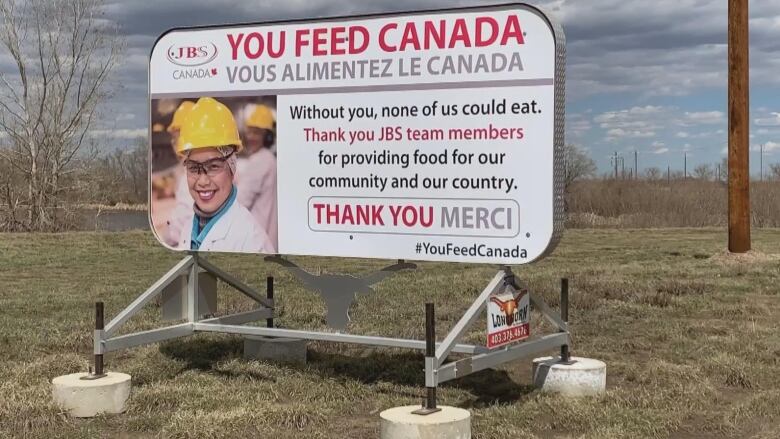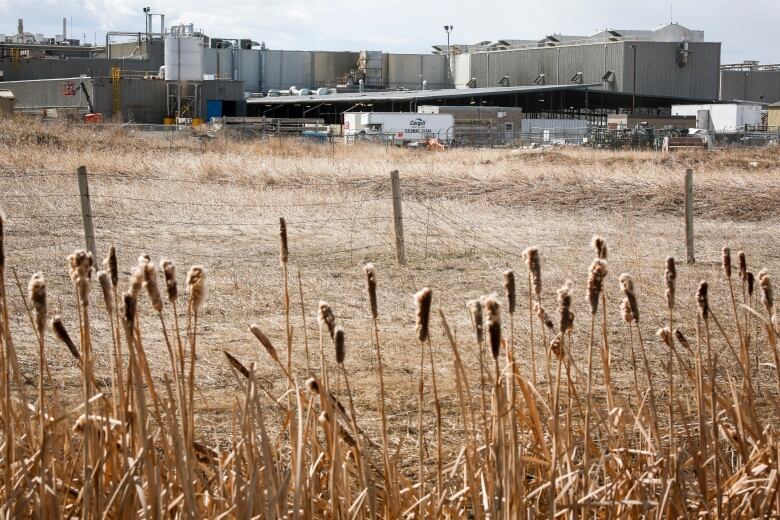As Trump moves to keep meat-processing plants open, Trudeau stresses workers' safety
McDonald's in Canada starts importing beef from U.S. in response to supply issues

Prime Minister Justin Trudeau wouldn't say today whether his government would follow the lead of U.S. President Donald Trump's administration andorder meat-processing plants to stay open during the pandemicbut stressed that workers' safety is a priority.
Yesterday, in response to concerns about food shortages and supply chain disruptions, Trump issued an executive order under the Defense Production Act to compel meat-processing plants to continue operating.
The world's biggest meat companies including Smithfield Foods Inc., Cargill Inc., JBS USA and Tyson have temporarily shuttered operations at about 20 slaughterhouses and processing plants in North America after workers fellill with COVID-19.
In Canada, theCargill Inc. meat-processing plant near High River, Alta,is now the scene of the country's largest single site outbreak. Alberta public health officials have counted1,167 cases linked to theplant, 759 of them plant workers.
The Cargill plant and the JBS plant in southern Alberta where dozens more workers have tested positive together supply about two-thirds of Canada's beef.
WATCH |Trudeau questioned about meat packing plants and safety of the food supply
When asked if he'd follow Trump's lead and force plants to stay open, Trudeau said his government is watching the industry closely.
"We're watching with interest and concern some of the issues facing meat producers and the supply chain across the agricultural industry," he told reporters during his daily briefing this morning.
"We need to make sure that those supply chains can keep functioning,but we also need to make sure that the people who work in those supply chains and will continue to need to work in difficult circumstances over the coming weeks and months as we continue to battle COVID-19 are kept safe."
This morning, McDonald's Canada which prominently mentions itsuse of Canadian beefin its advertising announced it will start importing meat as Canada's beef supply chain struggles to meet current demand.
The company said in a statement that its change in policy is due to limited processing capacity at Canadian suppliers,such as the Cargill plant.
Minister of Agriculture and Agri-Food Marie-Claude Bibeau said she's been working with the provinces and the Canada Food Inspection Agency tomake sure meat suppliescan be distributed in case of a shortage. Provincial inspectors are responsible for overseeing meat that's distributedwithin provinces, while the federal agency inspects food that moves across provincial boundaries.
"If we face a food shortage in one province or one territory, then insuch a particular circumstance the CFIA is absolutely open toallow some movement between provinces and territorieseven if has been inspected under a provincial authority," Bibeau told a parliamentary committee Wednesday night.
"While Canadians continue to have access to an abundance of food, we certainly recognize that many agriculture sectors are impacted by COVID-19.
"This has a domino effect on ranchers, increasing costs for cattle and hog producers as they need to keep their animals longer on farms, while prices are changing rapidly. I know that some producers are now forced to humanely cull some of their animals a hard decision they only make as last resort."
Concerns about TFWs' safety
The meat supply issue isreinforcing concerns about the living conditions of temporary foreign workers.
A large numberof the workersat the Cargill facility are Filipino; someare temporary foreign workers and others are permanent residents.

Earlier this week, at least 40 workers at a Kent Bridge, Ont. greenhouse tested positive for COVID-19.
Authorities say most of the employees at Greenhill Produce who have tested positive for the disease are migrant workers, but most have been in Canada fromfour months to a year,or more.
Greenhill Produce operations manager Justin Geertsema saidjust underhalf of his company's workforce arein self-isolation due to COVID-19.
"We're not sure what the next few weeks will look like," he said. "It'll be difficult for everybody, but all we know is that we just have such an amazing team here."
Any temporary foreign worker arriving in Canada has to self-isolate for two weeks, but industry critics and labour groups have raised concerns about the tight quarters most migrants workers live in while in Canada.
"Sadly, Ithink this virus has pointed out some of the areas that we need to do better at," said Chief PublicHealthOfficerDr. Theresa Tam during a news briefing on Wednesday.
"Workplaces need to have good plans if they are to continue, or if they are to think about re-opening according to public health advice."
Watch: Dr. Theresa Tam on workplace pandemic plans
Tam said the pandemic has focused attention on how Canada treats vulnerable peoplesuch as workers in close-quarters settings, seniors in long-term care homes and the homeless.
"I think in line with this next phase, we need to do better in each of those settings," she said.
The federal government has set aside $50 million to help farmers who rely on temporary foreign workers during the COVID-19 crisis. Employers are eligible for $1,500 per foreign worker to help cover the costs of complying with a mandatory two-week quarantine upon their arrival in Canada.
"We are working very closely with the agriculture industry to ensure that people get good, healthy food, particularly as we embark upon the summer [when] there will be a need and an ability to get lots of fresh vegetables and produce from across the country," said Trudeau on Wednesday.
"We need to continue to stay vigilant because of the large disruptions across many different sectors in our country including, obviously, agriculture."
With files from the Reuters and the Canadian Press















_(720p).jpg)


 OFFICIAL HD MUSIC VIDEO.jpg)
.jpg)



























































































